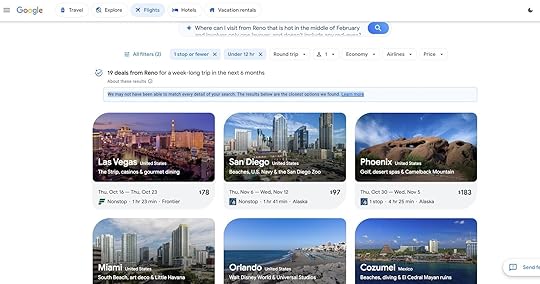We Tested Google’s New AI Flight Deals Tool. Here’s What It Got Right (and Very Wrong).

Google is testing a new AI tool that could transform the way travelers find and book flights. On August 14, the company announced a major update to Google Flights. It’s a conversational AI tool called “Flight Deals,” allowing you to talk to Google Flights the same way you’d ask a friend to help you find flight deals. It’s rolling out over the next few weeks in the United States, Canada, and India, and could signal what Google thinks will be the future of online travel booking. It’s the latest of many AI-forward changes to Google’s travel-planning landscape.

Photo: Google Flight Deals
Flight Deals is built on Google’s latest Gemini AI model, using natural language processing to turn vague trip ideas into specific flight options. Instead of searching by fixed parameters like dates and destination, you can search for flights with open-ended prompts, such as “where can I take a week-long ski trip for under $1,000 this February” or “where can I fly direct from Chicago that has lots of beaches, warm weather, and a flight under six hours long?”
It will then return potentially dozens of flight options, with specific flights, dates, and destinations listed. Then, they’re ranked by cost savings, showing the percent off for flights that are 20 percent cheaper or more than typical. (Some of the cheapest flights even without a discount also appear in the search.) “The highest percentage savings is shown first,” according to Google’s FAQ page. “If multiple deals have the same savings percentage, the one with the lower absolute price is shown first.” The results can change frequently, so it’s worth running the same prompt multiple times over the course of a few days.
Google notes that Flight Deals is still in the beta-testing phase, and that it’s an addition to, not a replacement for, current Google Flights.
Does it work?
Flight Deals suggested Durango, Colorado, as a good place to scuba dive in February. Hmmm. Photo: WorldPictures/Shutterstock
In our editors’ experience, it’s not useful (yet). Users can enter prompts as detailed as they’d like, yet the results always take the same format: a grid of suggested locations and flight deals, but with no details about how any of the locations match your prompt. When we asked it to “recommend a place with world-class scuba diving and mountain biking,” it suggested locations like Durango, Colorado — landlocked and 6,500 feet above sea level. Many of the other locations it recommended offered water-based activities, like fishing, but the results hardly hit the nail on the head.
The lack of context means you have no idea why a location was suggested. When we asked it to “recommend somewhere we could backpack in Europe for two weeks for under $30 a day, and attend at least one major cultural festival while there,” it brought up only one location: Lisbon. Not only will Lisbon likely cost far more than $30 a day, but there was no mention of what cultural festival will be happening.
Considering the tool is new, it will likely become more refined and accurate as it gets used more. For now, on some of my searches, it populated a generic note at the bottom: “We may not have been able to match every detail of your search. The results below are the closest options we found.”
For now, it’s best to treat Flight Deals as an idea generator, not a replacement for traditional flight searches. It did seem to better handle inquiries that relate to flight specifics, rather than destination specifics. For example, while it didn’t ace the test on places to bike and scuba dive, it did understand when I asked it “Where can I visit from Reno that is hot in the middle of February, involves only one layover, and doesn’t include any red-eyes? Travel time should be under 12 hours total.” It brought up a wide range of destinations that fit the bill, including Las Vegas, Bogota, Miami, and Belize City.

Photo: Yarrrrrbright/Shutterstock
Matador Network’s AI travel assistant GuideGeek and other tools have long been able to make travel recommendations based on conversational prompts. However, Google’s Flight Deals is unique in that it’s directly integrated with real-time airfare prices and booking, just like Google Flights. Most general-purpose AI models like ChatGPT don’t have access to up-to-date flight prices, airline schedules, or booking engines. But Flight Deals can recommend and help book the exact deals it finds and give accurate information on pricing. A user could, in theory, prompt something like “find me the cheapest ticket to South Africa in October that’s not basic economy,” and it should find flight options you can book on the spot.
While conversational AI has changed trip planning, the leap to real-time booking through conversational AI could be a massive shift in how people decide where to travel. It’s also not the only major recent shift toward using AI from major Online Travel Agencies, or OTAs. Expedia recently unveiled an Instagram-based AI tool that will send users bookable itineraries based on any shared Instagram reels, and Booking.com’s “Smart Filter” lets users describe the hotel they want, rather than manually searching based on pre-determined filters. 
Matador Network's Blog
- Matador Network's profile
- 6 followers



